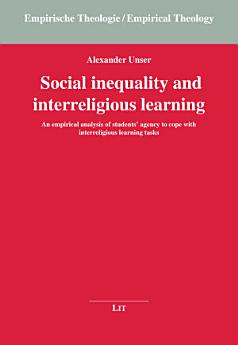Social inequality and interreligious learning: An empirical analysis of students' agency to cope with interreligious learning tasks
Jan 2019 · Empirische Theologie Book 32 · LIT Verlag Münster
Ebook
356
Pages
family_home
Eligible
info
reportRatings and reviews aren’t verified Learn More
About this ebook
Interreligious learning is viewed as a key educational task today. Increasing religious plurality in our societies and associated risks of societal tensions and conflicts necessitate that students deal at school with other religions, their belief systems, and the social reality of those who believe in them. Although several international studies have shown that some categories of students are at risk to be disadvantaged at school because of social inequality, this problem is currently not considered in theories of interreligious learning. Therefore, the present study investigates whether or not categories of students are disadvantaged in interreligious learning. In addition to theological and pedagogical insights about the problem of social inequality, this book presents an empirically validated action-theoretical model which helps to understand why some students have better or worse opportunities in interreligious learning. The action-theoretical model further proposes strategies to address unequal learning conditions in interreligious learning.
About the author
Alexander Unser (1986) works as a research associate at the Chair of Religious Education of the University of Würzburg
Rate this ebook
Tell us what you think.
Reading information
Smartphones and tablets
Install the Google Play Books app for Android and iPad/iPhone. It syncs automatically with your account and allows you to read online or offline wherever you are.
Laptops and computers
You can listen to audiobooks purchased on Google Play using your computer's web browser.
eReaders and other devices
To read on e-ink devices like Kobo eReaders, you'll need to download a file and transfer it to your device. Follow the detailed Help Center instructions to transfer the files to supported eReaders.







